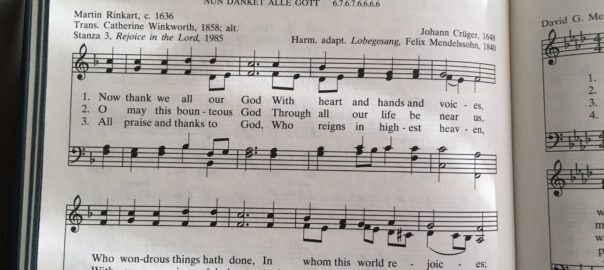When living through difficult times such as the world is facing now, remembering favorite hymns has often lifted spirits and carried people through hard times. “Now Thank We All Our God” is that kind of a hymn, reminding us to rely on our stable faith and to remain positive about life.
The term “hymn” does not refer to the well-known tunes, but to the words of the hymns. In the old days in England, hymnals were spiral bound, with the words at the top and the hymn tunes at the bottom. Hymns were announced in worship, indicating the choice of both poetry and tune. Most people do not realize that the words to hymns were often sung to many different tunes. As a different hymn example, the popular hymn “If Thou but Suffer God to Guide Thee” was set to over 600 hymn tunes in its history. These hymn stories are therefore about the writing of the words and what led the author to convey poetry of such depth.
“Now Thank We All Our God” was written in Germany during the 30 Years’ War, 1618-1648, a violent religious war between Catholics and Protestants. This hymn today is often used to celebrate Thanksgiving, but that is far from the circumstances in which it was written. These words were written by a minister, Martin Rinkart, who lived in a walled village, common in those days. As the 30 Years’ War became more violent, the village was continuously under siege. No one could leave the village, and food and supplies were dangerously low…but then things got worse. The plague then hit the village, and many people died every day. Among those who died were all the other ministers of the village. Rev. Rinkart was the only minister left, and he led as many as 12 funeral services each day.
Exhausted, Rinkart returned home one evening to find that his beloved mother had also died of the plague. This is the moving part of this historical story which will change your singing of this hymn for the rest of your lives. Rinkart sat down that evening and wrote the words to “Now Thank We All Our God”, including the poignant words that cannot be ignored, “who from our mother’s arms, has blessed us on our way”. Never sing this hymn nonchalantly again, but use it to remind yourself that the strength of your faith will be there for you.
